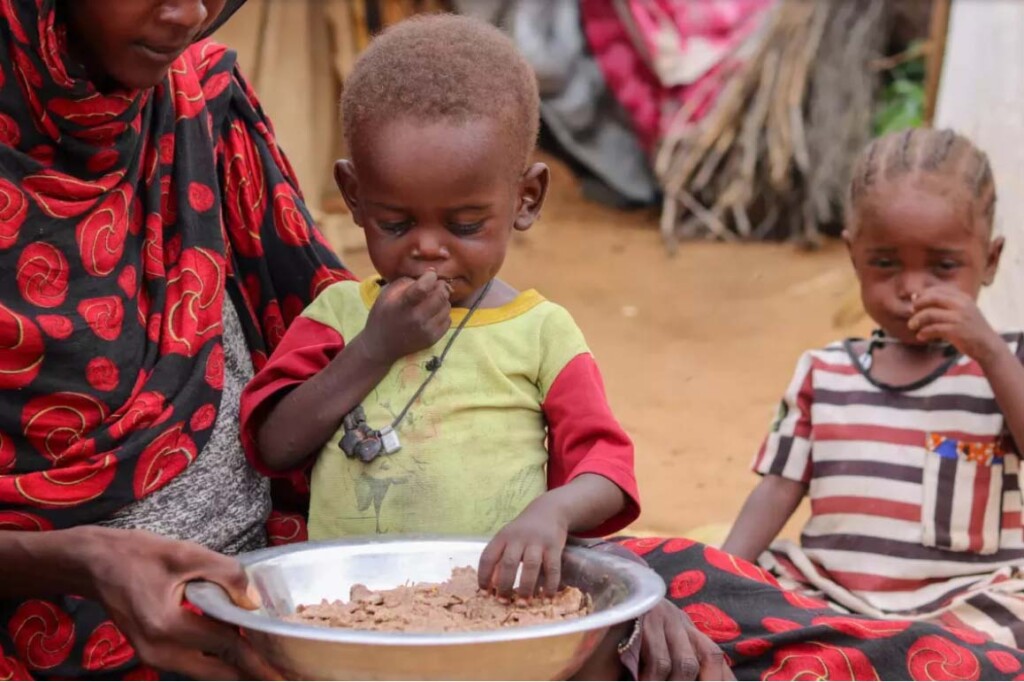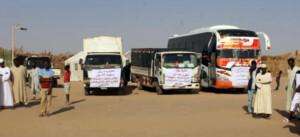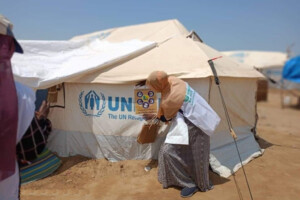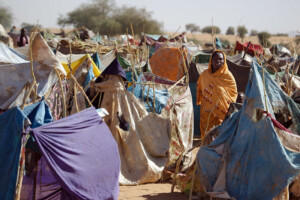Dozens dead from hunger and disease as devastation decimates North Darfur

Displaced children in Darfur eat a meal prepared from ambaz (animal feed), which is usually used as animal feed (Photo: UNICEF)
The emergency room of the Abu Shouk displacement camp in North Darfur’s capital of El Fasher, has reported the deaths of at least 73 children under five and 22 elderly people in just 40 days, as hunger and disease ravage displaced communities.
In a statement by the Abu Shouk Emergency Room yesterday, they confirmed that the victims were displaced residents who had fled from El Fasher’s northern neighbourhoods to shelters and residential areas inside Abu Shouk.
The group described the humanitarian and security situation as “worrying”, pointing to acute shortages of water, food, and health services. It warned that community kitchens that had been sustaining thousands, have stopped working due to lack of funding.
“About eight people are dying every day,” the chamber said, noting that the cost of a single meal for 20 families now amounts to SDG 7 million.
The emergency room cautioned that unburied bodies are piling up in streets and neighbourhoods due to insecurity, risking a major health disaster. It urged international organisations to secure safe humanitarian corridors for civilians trapped in the conflict.
’23 dead in September’
The Sudan Doctors’ Network confirmed a sharp rise in deaths caused by malnutrition in El Fasher, with 23 people, including five pregnant women, dying in September alone.
The network directly blamed the paramilitary Rapid Support Forces (RSF) for the crisis, citing its year-long siege on the city and blockade of humanitarian aid.
It accused the international community and the United Nations of complicity through silence and inaction “despite the clarity of the tragedy”.
‘3,384 civilians killed in six months’
A recent report by the Office of the United Nations High Commissioner for Human Rights (OHCHR) state that at least 3,384 civilians were killed in Sudan between January and June 2025. 80 per cent of the total casualties documented in 2024, with most of the victims were in Darfur, followed by Kordofan and Khartoum.
The UN report described a pattern of indiscriminate shelling, air raids, and drone strikes on densely populated areas. In April alone, RSF attacks on El Fasher and surrounding camps killed more than 270 displaced people in Abu Shouk and Zamzam camp. In March, SAF airstrikes on Tora market in North Darfur killed at least 350 civilians.
The UN also documented 990 unlawful killings outside hostilities, including summary executions. Both the SAF and RSF stand accused of carrying out extrajudicial killings, including the execution of children as young as 14. In one documented case, RSF fighters executed at least 30 men in Omdurman on 27 April.
The report further detailed widespread conflict-related sexual violence, arbitrary detention, and targeted killings of journalists, humanitarian workers, and civilians accused of supporting the opposing side.
‘Forgotten war’
UN High Commissioner for Human Rights Volker Türk warned that Sudan’s conflict is becoming a “forgotten war”, marked by impunity, ethnic hate speech, and systemic targeting of civilians.
“The increasing ethnic character of the conflict poses grave risks to Sudan’s stability and social cohesion,” he said, urging the international community to act decisively to stop further bloodshed and deliver humanitarian aid.
Sudan is now the site of the world’s largest humanitarian crisis, with 24.6 million people facing severe food insecurity and 19 million without clean water. Cholera outbreaks are spreading, while at least 30 aid and health workers have been killed this year alone.
“The violence must end – in all its heinous forms,” the report concluded. “Those responsible must be held accountable.”











 and then
and then